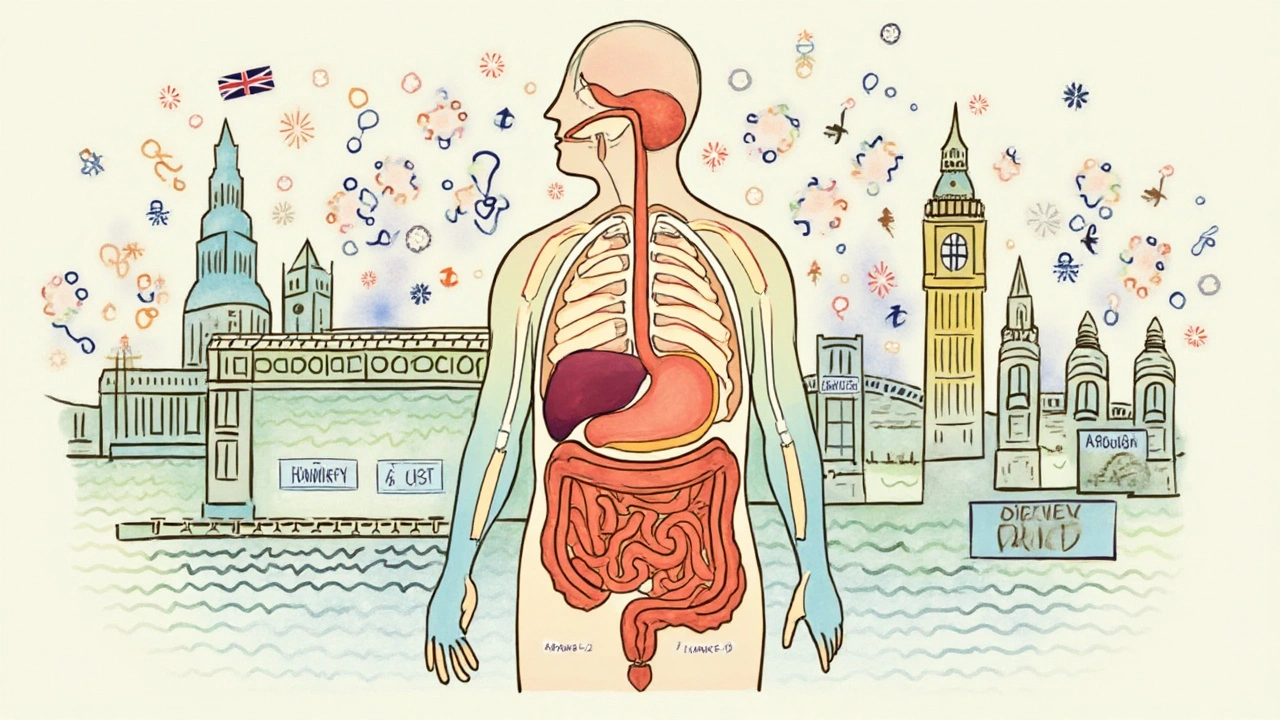Most people don't give much thought to their gut unless it's causing problems. Yet, the state of our gut can influence just about every other part of our bodies. From the immune system to our mental well-being, a healthy gut is essential.
In this article, we will unravel the critical role that gut health plays in maintaining overall wellness. You'll discover what the gut microbiome is, how it impacts various bodily systems, and gain practical tips to improve your digestive health.
- The Importance of Gut Health
- What is the Gut Microbiome?
- Impact of Gut Health on the Body
- Tips for a Healthy Gut
The Importance of Gut Health
Our gut, often called the second brain, is essential for our body's health. It's not just a digestive mechanism; it's a bustling city of trillions of bacteria and other microorganisms, known collectively as the gut microbiome. These microorganisms play a vital role in how we process food, fight diseases, and even influence our mood and mental health.
One of the key functions of a healthy gut is nutrient absorption. Without it, vitamins, minerals, and amino acids from our diet wouldn't be properly absorbed, leading to deficiencies that can cause various health issues. The gut also acts as a barrier, preventing harmful substances from entering the body while allowing beneficial nutrients to pass through.
The gut is deeply intertwined with the immune system, with over 70% of our immune cells residing there. This means a well-balanced gut microbiome can support the immune system's efficiency, making it easier to fend off infections. On the other hand, an unhealthy gut can lead to chronic inflammation, contributing to diseases such as irritable bowel syndrome (IBS), diabetes, and even certain cancers.
The connection between gut health and mental health is equally fascinating. Studies have shown that the gut produces neurotransmitters like serotonin, often referred to as the 'happy chemical.' An imbalanced gut can affect the production of these neurotransmitters, contributing to mood disorders like anxiety and depression.
As Dr. Emeran Mayer, a professor at UCLA, points out, "The gut and the brain talk to each other, so when your gut is inflamed, your brain also gets inflamed."
A balanced diet rich in fiber, probiotics, and prebiotics can promote a healthy gut. Fiber-rich foods such as fruits, vegetables, and whole grains help nourish the gut bacteria, while probiotics found in fermented foods like yogurt and kimchi add beneficial bacteria to your gut microbiome. Prebiotics, on the other hand, act as food for these good bacteria, found in foods like garlic, onions, and bananas.
Interestingly, new research suggests that gut health can even impact sleep quality. The gut microbiome helps regulate the body's sleep-wake cycles by influencing the production of sleep-related neurotransmitters. So, improving your gut health may also lead to better sleep.
Understanding the importance of gut health can inspire lifestyle changes that promote a balanced microbiome. Regular exercise, adequate hydration, stress management, and a balanced diet are all crucial for maintaining gut health. Given its far-reaching impact on various bodily functions, taking care of your gut should be a top priority for anyone looking to improve their quality of life.

What is the Gut Microbiome?
At the heart of our digestive system lies an incredibly complex community of microorganisms known as the gut microbiome. This ecosystem of bacteria, viruses, and fungi plays a fundamental role in our health. Believe it or not, our gut houses trillions of these tiny organisms—outnumbering our body's cells by about 10 to 1. It's a bustling micro-world, thriving within us and influencing numerous aspects of our well-being.
Interestingly, the gut microbiome starts forming from the moment we are born. As we grow, the diversity and complexity of these microbes evolve based on various factors, including our diet, lifestyle, and environment. Different species of bacteria carry out specialized functions, making the microbiome a highly dynamic and adaptable entity.
One of the key roles played by the gut microbiome is aiding in digestion. Certain bacteria are responsible for breaking down complex carbohydrates, fibers, and proteins that our stomach and intestines can't digest on their own. This not only helps in nutrient absorption but also produces beneficial byproducts like short-chain fatty acids that have numerous health benefits.
Moreover, the gut microbiome plays a crucial role in our immune system. About 70% of our immune cells reside in the gut, creating a first line of defense against harmful pathogens. By maintaining a balanced and diverse microbiome, we enhance our body's ability to fight off infections and reduce inflammation. This influence on immunity is one of the many ways the gut regulates overall well-being.
Recent research also points to the gut-brain axis, a bidirectional communication system between the gut and brain. Our microbiome produces neurotransmitters like serotonin, which affects our mood, appetite, and sleep. This connection reveals how closely linked our mental health is with our gut health.
Dr. Jane Foster, a renowned neuroscientist, once said,
“The gut microbiome can influence brain chemistry and behavior. It's fascinating how disorders like depression and anxiety can be traced back to an imbalance in gut bacteria.”This reaffirms the importance of fostering a healthy microbiome for mental well-being.
Another fascinating aspect is how antibiotics can disrupt the gut microbiome. While antibiotics are vital for eliminating harmful bacteria, they can also wipe out beneficial microbes, leading to a condition called dysbiosis. This imbalance can pave the way for digestive issues, weakened immunity, and other health problems. Therefore, it's essential to use antibiotics only when necessary and support your gut health afterward with probiotics and prebiotics.
Creating and maintaining a healthy gut microbiome involves a diet rich in diverse, nutrient-dense foods. Fermented foods like yogurt, kimchi, and sauerkraut are excellent sources of probiotics, which introduce beneficial bacteria into the gut. Fiber-rich foods feed these organisms, helping them flourish and improve digestive health.

Impact of Gut Health on the Body
Our gut is often referred to as the body's second brain, and for good reason. The gut-brain axis highlights the profound connection between gut health and mental well-being. A healthy digestive system doesn't just process food, it plays a crucial role in producing neurotransmitters like serotonin. Did you know that around 90% of serotonin, the hormone responsible for happiness, is produced in the gut? This fact alone shows how essential a well-functioning gut microbiome is for mental health.
But mental health is just the tip of the iceberg. The immune system, which protects us from illnesses, is deeply influenced by the gut. About 70-80% of the immune system resides in the gut-associated lymphoid tissue (GALT). When our gut is healthy, it acts as a shield, keeping harmful pathogens at bay and allowing beneficial nutrients to be absorbed. This delicate balance ensures that the body can defend against infections and diseases more effectively.
In addition to mental health and immunity, the gut microbiome is pivotal for metabolic functions. The diverse microorganisms in our gut aid in breaking down complex carbohydrates, fibers, and proteins, turning them into essential nutrients and short-chain fatty acids. This process not only fuels our body but also maintains a healthy weight and prevents conditions like obesity and diabetes. An imbalance in gut flora, known as dysbiosis, has been linked to metabolic disorders and can significantly impact our overall health.
Remarkably, gut health also affects our skin. Conditions like acne, eczema, and psoriasis have been connected to the state of the digestive system. This connection is often referred to as the gut-skin axis. A balanced gut flora ensures that anti-inflammatory processes are in place, reducing the likelihood of skin irritations and promoting a clearer complexion.
"The gut microbiome is a complex community that affects virtually every aspect of our biology," says Dr. Rob Knight, a prominent researcher in the field of microbiome studies.
The heart, too, is influenced by the gut. A balanced gut flora helps regulate blood pressure and cholesterol levels. Research indicates that certain gut bacteria produce metabolites that can positively influence cardiovascular health. These metabolites help lower bad cholesterol and promote good cholesterol, which is vital for a healthy heart.
Given the vast influence of gut health on different bodily systems, it's undeniable that maintaining a healthy gut is paramount for overall well-being. Ensuring a balanced diet rich in fibers, probiotics, and prebiotics can foster a robust gut microbiome and, by extension, a healthier body.

Tips for a Healthy Gut
Maintaining a healthy gut might seem daunting, but with a few lifestyle adjustments, you can significantly improve your digestive health. The key to great gut health lies in what you eat, how you move, and how you manage stress. Start by incorporating fiber-rich foods into your diet, as they promote the growth of beneficial bacteria in your gut.
Fiber is essential for maintaining a balanced gut microbiome. Fruits, vegetables, whole grains, and legumes are excellent sources. Incorporating a variety of these foods ensures you get both soluble and insoluble fibers, each playing a unique role in digestion.
Prebiotics and probiotics are another vital part of a healthy gut diet. Prebiotics are food for the good bacteria and can be found in foods like garlic, onions, and bananas. Probiotics, on the other hand, are live beneficial bacteria. These are abundant in fermented foods like yogurt, kefir, sauerkraut, and miso.
Hydration is often overlooked but is crucial for gut health. Water helps break down food so your body can absorb the nutrients, and it helps to keep your digestive system clean by moving things through smoothly. Try to drink at least eight glasses of water a day, and more if you’re active or live in a hot climate.
Exercise also plays a significant role in maintaining a healthy gut. It helps reduce inflammation and can increase the populations of beneficial bacteria in your gut. Activities like walking, running, and yoga can make a difference. Make it a habit to engage in at least 30 minutes of moderate physical activity most days of the week.
Managing stress is another critical factor. Chronic stress can wreak havoc on your digestive system, causing issues like irritable bowel syndrome. Techniques such as deep breathing exercises, meditation, and even hobbies can help reduce stress levels. Don’t underestimate the power of a well-balanced mind.
Sleep is yet another vital element. Poor sleep can negatively impact your gut health by disturbing the balance of beneficial bacteria. Aim for 7-9 hours of quality sleep per night. Create a bedtime routine that promotes relaxation and stick to it.
Antibiotics, though sometimes necessary, can disrupt the balance of gut bacteria. If you have to take them, make sure to follow up with a robust regimen of probiotics and prebiotics to restore balance. A balanced gut is a healthy gut.
According to Dr. Robynne Chutkan, a leading gastroenterologist, “The gut microbiome is as important as any organ in your body. Its health can affect everything from your digestion to your mental health.”
By making these simple, yet effective changes, you can cultivate a healthier gut, leading to an improved sense of well-being. Your journey to better gut health starts today, with these practical and actionable tips.
